In view of the rapid development of Macao and the new trends of higher education, the University of Macau (UM) has positioned itself as a university that is rooted in Macao to help develop the city, integrated with the Guangdong-Hong Kong-Macao Greater Bay Area (GBA) to serve the country, and geared towards the world to make a greater contribution. According to UM Rector Yonghua Song, UM’s development strategies are designed to not only meet the needs of Macao, but also to conform with international practices, in order to be better prepared for the opportunities and challenges brought about by the development of the GBA and the rest of the world.
Rooted in Macao to Help Develop the City
UM is the only public comprehensive international university in Macao. Its talent development strategies revolve around its commitment to supporting the city’s development. To fulfil this mission, the university has initiated various programmes for nurturing professionals in different fields. For instance, the university has launched a Macao Fellow Programme to nurture young scholars from Macao and to encourage qualified residents to pursue career development in Macao. Also, the university has established the Department of Integrated Resort and Tourism Management to support the government’s effort to develop the city into a tourism education and training base in the GBA.
UM has also intensified its efforts to train Portuguese language teachers and Chinese-Portuguese bilingual professionals to support Macao’s development into a service platform for trade cooperation between China and Portuguese-speaking countries. For instance, the university has established the Centre for Constitutional Law and Basic Law Studies and the Macao Base for Primary & Secondary Education in Humanities & Social Sciences (the latter being a collaborative project with Peking University). It has also launched the Chinese and Portuguese Bilingual Talent Nurturing Scheme and the Bachelor of Law programme, which is a five-year day-time programme conducted in Chinese and Portuguese. These measures aim to make maximum use of Macao’s strengths and meet the growing demand for Chinese-Portuguese bilingual professionals in China.
UM also vigorously supports Macao’s development into a base for cultural exchange and collaboration, where Chinese culture is the predominant component and a variety of other cultures co-exist in harmony. To this end, the university has launched a master’s degree programme in Chinese history and culture, Chinese language courses for international students, and teacher training programmes for language instructors. It has also inaugurated a new Cultural Building, which houses the Centre for Chinese History and Culture, Centre for Macau Studies, Confucius Institute, Chinese-Portuguese Bilingual Teaching and Training Centre, and Centre for Arts and Design, all of which are strong cultural or teaching units at UM. Together, they provide strong support to Macao’s efforts to disseminate traditional Chinese culture.
The two new education bases, namely the Macao Base for Primary and Secondary Education in Humanities and Social Sciences, and the Macao Base for Primary and Secondary STEM Education, represent UM’s effort to support basic education in Macao. In addition, UM’s Faculty of Education conducts the triannual Programme for International Student Assessment (PISA), which provides reference for the SAR government to formulate education policies suited to the city’s development.
One of UM’s missions is to serve the local community through scientific research. The university has initiated research studies on issues that are of interest to the local society, such as responsible gaming, testing for civil engineering, and macroeconomic forecasts, in order to supply data for the local community, the government, and researchers. UM has also initiated research studies related to medical sciences and health sciences, in the areas of Chinese medical sciences, precision medicine for cancer treatment, reproduction, development and ageing, as well as translational medicine, in order to enhance the overall health of Macao residents. In addition, UM has spared no effort to promote the study of the various aspects of Macao, including its history, society, law, education, and business. The research data and theoretical analyses from these studies will provide the basis for policymaking to improve residents’ livelihood and cultural life.
Integrated with the GBA to Serve the Country
The Outline of the Strategies for the Development of the Guangdong-Hong Kong-Macao Greater Bay Area sets out clear goals and instructions for higher education development. In line with the GBA’s development strategy, UM strives to develop itself into a crucial node in the so-called ‘Guangzhou-Shenzhen-Hong Kong-Macao Innovation and Technology Corridor’, as well as a hub for technological innovation in western GBA.
The GBA has brought many opportunities to UM. For instance, many of the research projects currently being conducted at UM respond to the needs of the GBA, in fields such as Chinese medical sciences, microelectronics, advanced materials, Internet of Things, big data, and Chinese-Portuguese bilingual education. According to Rector Song, UM plans to develop more research platforms in emerging fields to support national and regional development. It will also endeavour to assume a leading role in technological innovation in western GBA and will seek to expand its influence to other parts of the GBA.
UM is currently a member of many university alliances in the GBA, including an alliance of universities in Guangdong, Hong Kong and Macao. Jointly initiated with Sun Yat-sen University and the Chinese University of Hong Kong, this alliance currently has 37 member universities. UM has reached agreements with some partner universities in the GBA to share research resources. It has also launched ‘2+2’ joint undergraduate programmes and joint PhD programmes with other universities. According to Rector Song, against the background of collaborative development in the GBA, UM will further promote collaboration with GBA universities in teaching and research. He says,‘Guangdong, Hong Kong, and Macao should pursue collaborative development that goes beyond the constraints of geographic boundaries, which will create more opportunities for UM. For example, our graduates will have more career options that are not limited to Macao.’
Geared Towards the World to Make a Greater Contribution
UM is an internationalised university whose faculty members and students come from diverse cultural backgrounds. But Rector Song hopes to make the university even more international.
UM students come from nearly 50 countries. The diversity of the student body creates favourable conditions for nurturing professionals with an international perspective and global competitiveness. Rector Song stresses that UM aims to produce graduates with a love for their motherland, a global mindset, international competitiveness, and a desire to make the world a better place. In recent years, UM has spared no effort to foster partnerships with well-known universities both at home and abroad. For instance, UM has launched joint programmes with the following universities: Imperial College London, the University of Edinburgh, the University of Bristol, the University of Toronto, Tsinghua University, University of Bath, Zhejiang University, Temple University, and the University of Lisbon.
Rector Song believes that with the new opportunities created by the development of the GBA, Macao’s multicultural environment, and the university’s high degree of internalisation, UM will be able to make a greater contribution to the world.
Source: UMagazine Issue 21
Related articles: UM and Macao over the Past 20 Years New Research Blueprint to Meet Global Trends Enhancing UM’s International Reputation with a New Global Strategy Supporting Macao’s Development with Whole-person Education Creating an Environment to Support the University’s Development
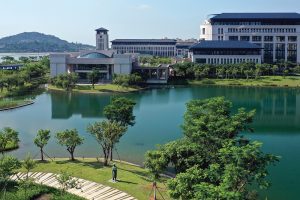
UM’s development strategies are designed to conform with international practices
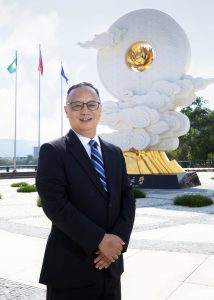
UM Rector Yonghua Song
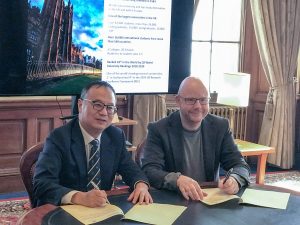
UM and the University of Edinburgh sign a collaboration agreement
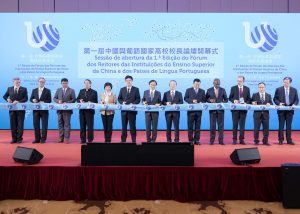
UM hosts the first forum for heads of higher education institutions
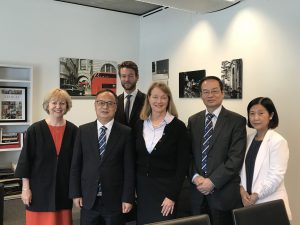
A delegation led by UM Rector Yonghua Song (2nd from left) visits Imperial College London
